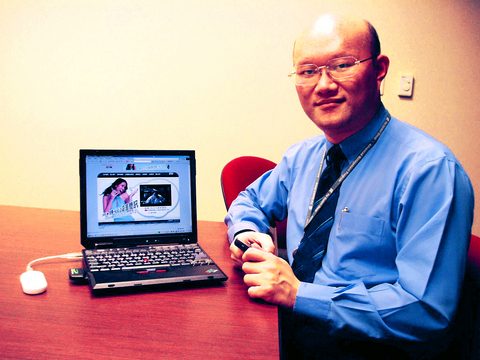Far EasTone Telecommunications Co (遠傳電信), the nation's second-biggest mobile operator, yesterday said it planned to offer its first 3.5-generation (3.5G) handsets by the end of the year.
Taiwan will join the ranks of tech pioneers such as Japan, Hong Kong, the UK and the US in having commercially launched high-speed wireless communication services on mobile phones with High Speed Downlink Packet Access (HSDPA), or 3.5G, technology.
Far EasTone is the first company to offer an HSDPA data card with a transmission speed of 3.6 megabytes per second for personal computer users. Rival Chunghwa Telecom Co (

PHOTO: WANG YI-HUNG, TAIPEI TIMES
"We plan to launch HSDPA phones by the year's end, and HSDPA routers for households to share the service at home will follow soon," Roger Chen (陳立人), a director of Far EasTone, said in an interview yesterday.
Chen said Far EasTone is in talks with Motorola Inc and other handset vendors to supply the HSDPA phones.
Far EasTone's HSDPA service enables 3.6 megabytes per second data transmission, allowing mobile users to download a one-minute music video in just 22 seconds, 1.8 times faster than the broadband network, or ADSL service, at 2 megabytes per second.
"The 3.5G data card has been popular since its launch because of its transmission speed, easy installation and compatibility with desktop computers," Chen said.
The number of subscribers to the 3.5G data card since its launch last month has already equalled the total for the 3G data card in the first six months after its launch last August, Chen said, without giving detailed figures.
"For PC users, we believe the 3.5G data cards could be a substitute for ADSL users at home and Wi-Fi subscribers," Chen said.
"They don't have to bother searching for network hot spots. And our coverage is more comprehensive than WiFly, the wireless connection offered by the Taipei City Government," Chen said.

To many, Tatu City on the outskirts of Nairobi looks like a success. The first city entirely built by a private company to be operational in east Africa, with about 25,000 people living and working there, it accounts for about two-thirds of all foreign investment in Kenya. Its low-tax status has attracted more than 100 businesses including Heineken, coffee brand Dormans, and the biggest call-center and cold-chain transport firms in the region. However, to some local politicians, Tatu City has looked more like a target for extortion. A parade of governors have demanded land worth millions of dollars in exchange

An Indonesian animated movie is smashing regional box office records and could be set for wider success as it prepares to open beyond the Southeast Asian archipelago’s silver screens. Jumbo — a film based on the adventures of main character, Don, a large orphaned Indonesian boy facing bullying at school — last month became the highest-grossing Southeast Asian animated film, raking in more than US$8 million. Released at the end of March to coincide with the Eid holidays after the Islamic fasting month of Ramadan, the movie has hit 8 million ticket sales, the third-highest in Indonesian cinema history, Film

Taiwan Semiconductor Manufacturing Co’s (TSMC, 台積電) revenue jumped 48 percent last month, underscoring how electronics firms scrambled to acquire essential components before global tariffs took effect. The main chipmaker for Apple Inc and Nvidia Corp reported monthly sales of NT$349.6 billion (US$11.6 billion). That compares with the average analysts’ estimate for a 38 percent rise in second-quarter revenue. US President Donald Trump’s trade war is prompting economists to retool GDP forecasts worldwide, casting doubt over the outlook for everything from iPhone demand to computing and datacenter construction. However, TSMC — a barometer for global tech spending given its central role in the

Alchip Technologies Ltd (世芯), an application-specific integrated circuit (ASIC) designer specializing in server chips, expects revenue to decline this year due to sagging demand for 5-nanometer artificial intelligence (AI) chips from a North America-based major customer, a company executive said yesterday. That would be the first contraction in revenue for Alchip as it has been enjoying strong revenue growth over the past few years, benefiting from cloud-service providers’ moves to reduce dependence on Nvidia Corp’s expensive AI chips by building their own AI accelerator by outsourcing chip design. The 5-nanometer chip was supposed to be a new growth engine as the lifecycle